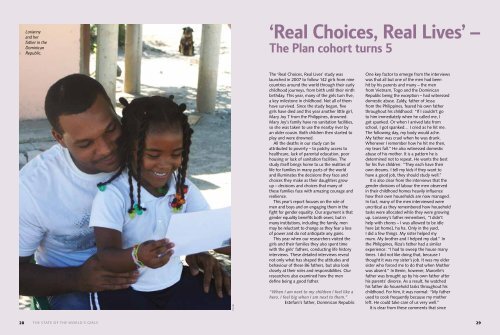Because I am a girl: The State of the World's ... - Plan Deutschland
Because I am a girl: The State of the World's ... - Plan Deutschland
Because I am a girl: The State of the World's ... - Plan Deutschland
Create successful ePaper yourself
Turn your PDF publications into a flip-book with our unique Google optimized e-Paper software.
Lorianny<br />
and her<br />
fa<strong>the</strong>r in <strong>the</strong><br />
Dominican<br />
Republic.<br />
‘Real Choices, Real Lives’ –<br />
<strong>The</strong> <strong>Plan</strong> cohort turns 5<br />
P l a n<br />
<strong>The</strong> ‘Real Choices, Real Lives’ study was<br />
launched in 2007 to follow 142 <strong>girl</strong>s from nine<br />
countries around <strong>the</strong> world through <strong>the</strong>ir early<br />
childhood journeys, from birth until <strong>the</strong>ir ninth<br />
birthday. This year, many <strong>of</strong> <strong>the</strong> <strong>girl</strong>s turn five,<br />
a key milestone in childhood. Not all <strong>of</strong> <strong>the</strong>m<br />
have survived. Since <strong>the</strong> study began, five<br />
<strong>girl</strong>s have died and this year ano<strong>the</strong>r little <strong>girl</strong>,<br />
Mary Joy T from <strong>the</strong> Philippines, drowned.<br />
Mary Joy’s f<strong>am</strong>ily have no sanitation facilities,<br />
so she was taken to use <strong>the</strong> nearby river by<br />
an older cousin. Both children <strong>the</strong>n started to<br />
play and were drowned.<br />
All <strong>the</strong> deaths in our study can be<br />
attributed to poverty – to patchy access to<br />
healthcare, lack <strong>of</strong> parental education, poor<br />
housing or lack <strong>of</strong> sanitation facilities. <strong>The</strong><br />
study itself brings home to us <strong>the</strong> realities <strong>of</strong><br />
life for f<strong>am</strong>ilies in many parts <strong>of</strong> <strong>the</strong> world<br />
and illuminates <strong>the</strong> decisions <strong>the</strong>y face and<br />
choices <strong>the</strong>y make as <strong>the</strong>ir daughters grow<br />
up – decisions and choices that many <strong>of</strong><br />
<strong>the</strong>se f<strong>am</strong>ilies face with <strong>am</strong>azing courage and<br />
resilience.<br />
This year’s report focuses on <strong>the</strong> role <strong>of</strong><br />
men and boys and on engaging <strong>the</strong>m in <strong>the</strong><br />
fight for gender equality. Our argument is that<br />
gender equality benefits both sexes; but in<br />
many institutions, including <strong>the</strong> f<strong>am</strong>ily, men<br />
may be reluctant to change as <strong>the</strong>y fear a loss<br />
<strong>of</strong> power and do not anticipate any gains.<br />
This year when our researchers visited <strong>the</strong><br />
<strong>girl</strong>s and <strong>the</strong>ir f<strong>am</strong>ilies <strong>the</strong>y also spent time<br />
with <strong>the</strong> <strong>girl</strong>s’ fa<strong>the</strong>rs, conducting life history<br />
interviews. <strong>The</strong>se detailed interviews reveal<br />
not only what has shaped <strong>the</strong> attitudes and<br />
behaviour <strong>of</strong> <strong>the</strong>se 86 fa<strong>the</strong>rs, but also look<br />
closely at <strong>the</strong>ir roles and responsibilities. Our<br />
researchers also ex<strong>am</strong>ined how <strong>the</strong> men<br />
define being a good fa<strong>the</strong>r.<br />
“When I <strong>am</strong> next to my children I feel like a<br />
hero. I feel big when I <strong>am</strong> next to <strong>the</strong>m.”<br />
Estefani’s fa<strong>the</strong>r, Dominican Republic<br />
One key factor to emerge from <strong>the</strong> interviews<br />
was that all but one <strong>of</strong> <strong>the</strong> men had been<br />
hit by his parents and many – <strong>the</strong> men<br />
from Vietn<strong>am</strong>, Togo and <strong>the</strong> Dominican<br />
Republic being <strong>the</strong> exception – had witnessed<br />
domestic abuse. Zaldy, fa<strong>the</strong>r <strong>of</strong> Jessa<br />
from <strong>the</strong> Philippines, feared his own fa<strong>the</strong>r<br />
throughout his childhood: “If I couldn’t go<br />
to him immediately when he called me, I<br />
got spanked. Or when I arrived late from<br />
school, I got spanked… I cried as he hit me.<br />
<strong>The</strong> following day, my body would ache.<br />
My fa<strong>the</strong>r was cruel when he was drunk.<br />
Whenever I remember how he hit me <strong>the</strong>n,<br />
my tears fall.” He also witnessed domestic<br />
abuse <strong>of</strong> his mo<strong>the</strong>r. It is a pattern he is<br />
determined not to repeat. He wants <strong>the</strong> best<br />
for his five children: “<strong>The</strong>y each have <strong>the</strong>ir<br />
own dre<strong>am</strong>s. I tell my kids if <strong>the</strong>y want to<br />
have a good job, <strong>the</strong>y should study well.”<br />
It is also clear from <strong>the</strong> interviews that <strong>the</strong><br />
gender divisions <strong>of</strong> labour <strong>the</strong> men observed<br />
in <strong>the</strong>ir childhood homes heavily influence<br />
how <strong>the</strong>ir own households are now managed.<br />
In fact, many <strong>of</strong> <strong>the</strong> men interviewed were<br />
uncritical as <strong>the</strong>y remembered how household<br />
tasks were allocated while <strong>the</strong>y were growing<br />
up. Lorianny’s fa<strong>the</strong>r remembers, “I didn’t<br />
help with chores – I was allowed to be idle<br />
here [at home], ha ha. Only in <strong>the</strong> yard,<br />
I did a few things. My sister helped my<br />
mum. My bro<strong>the</strong>r and I helped my dad.” In<br />
<strong>the</strong> Philippines, Riza’s fa<strong>the</strong>r had a similar<br />
experience: “I had to sweep <strong>the</strong> house many<br />
times. I did not like doing that, because I<br />
thought it was my sister’s job. It was my elder<br />
sister who forced me to do that when Mo<strong>the</strong>r<br />
was absent.” In Benin, however, Marcelle’s<br />
fa<strong>the</strong>r was brought up by his own fa<strong>the</strong>r after<br />
his parents’ divorce. As a result, he watched<br />
his fa<strong>the</strong>r do household tasks throughout his<br />
childhood. For him, it was normal: “My fa<strong>the</strong>r<br />
used to cook frequently because my mo<strong>the</strong>r<br />
left. He could take care <strong>of</strong> us very well.”<br />
It is clear from <strong>the</strong>se comments that since<br />
28 <strong>the</strong> s tate <strong>of</strong> <strong>the</strong> world’s <strong>girl</strong>s 29



